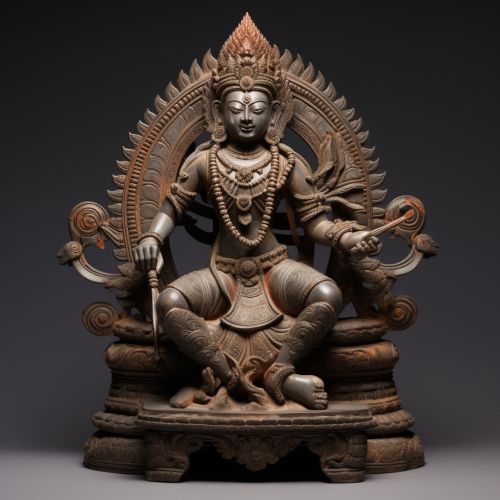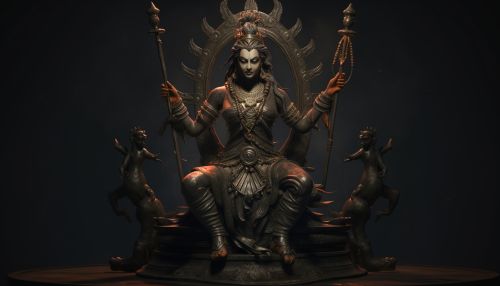Indra
Overview
Indra is a principal deity in the Vedic religion, an ancient religion of the Indian subcontinent. He is the king of the gods and ruler of the heavens. Indra is associated with weather, war, and is often depicted wielding a thunderbolt. His importance in the religious and cultural life of ancient India is reflected in his numerous appearances in the Rigveda, the oldest of the four Vedas, which are the sacred texts of Hinduism.
Etymology and Other Names
The name 'Indra' comes from the Sanskrit word 'Ind', which means to conquer or to defeat. Thus, Indra is often referred to as the conqueror or defeater. He is also known by several other names in the Vedas, including Sakra (the powerful one), Vajri (the thunderbolt wielder), and Purandara (destroyer of cities).
Iconography


Indra is usually depicted as a muscular man with a lustrous body and four arms. He holds a thunderbolt (vajra) in one hand, which is his primary weapon. In his other hands, he holds a bow, a net, and a hook. He is often shown riding his white elephant, Airavata, which was born from the churning of the ocean.
Mythology
Indra plays a central role in many stories in the Rigveda. He is often portrayed as a heroic figure, battling against the forces of chaos and darkness to establish order in the world. One of his most famous exploits is the slaying of the dragon Vritra, who had blocked the waters of the world. By killing Vritra, Indra released the waters and brought life to the earth.
Worship and Rituals
Indra was a major deity in the Vedic religion and was worshipped through a variety of rituals. The most important of these was the Soma sacrifice, in which the sacred drink Soma was offered to Indra to gain his favor. Other rituals included the Agnistoma (praise of Agni), the Vajapeya (drink of victory), and the Rajasuya (royal consecration).
Indra in Buddhism and Jainism
Indra also appears in other Indian religions such as Buddhism and Jainism. In Buddhism, Indra (known as Sakra) is a guardian deity who protects the Buddhist teachings. In Jainism, Indra is a deity who serves the Tirthankaras (spiritual teachers).
Decline in Importance
Over time, the importance of Indra in the religious life of India declined. This was due in part to the rise of the Trimurti (trinity) of Brahma, Vishnu, and Shiva in post-Vedic Hinduism. However, Indra continues to be revered in some parts of India and is a popular figure in Indian mythology.
